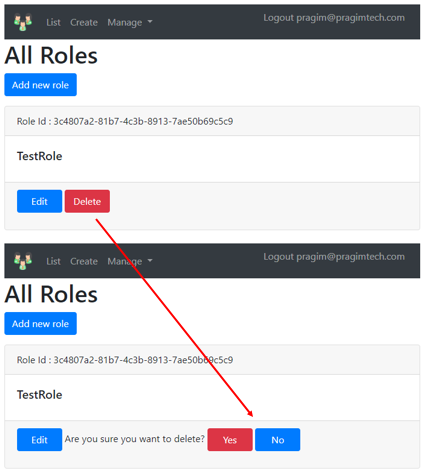Suggested Videos
Part 85 Edit identity user in asp.net core | Text | Slides
Part 86 - Delete identity user in asp.net core | Text | Slides
Part 87 - ASP.NET Core delete confirmation | Text | Slides
In this video we will discuss how to delete IdentityRole from the AspNetRoles database table using the identity api.
When the Delete button is clicked, the respective role must be deleted from the AspNetRoles table

DeleteRole Action in the Controller
Use the RoleManager service DeleteAsync() method to delete the role

Part 85 Edit identity user in asp.net core | Text | Slides
Part 86 - Delete identity user in asp.net core | Text | Slides
Part 87 - ASP.NET Core delete confirmation | Text | Slides
In this video we will discuss how to delete IdentityRole from the AspNetRoles database table using the identity api.
When the Delete button is clicked, the respective role must be deleted from the AspNetRoles table

<form asp-action="DeleteRole" asp-route-id="@role.Id" method="post">
<span id="confirmDeleteSpan_@role.Id" style="display:none">
<span>Are you sure you want
to delete?</span>
<button type="submit" class="btn
btn-danger">Yes</button>
<a href="#" class="btn
btn-primary"
onclick="confirmDelete('@role.Id', false)">No</a>
</span>
<span id="deleteSpan_@role.Id">
<a href="#" class="btn
btn-danger"
onclick="confirmDelete('@role.Id', true)">Delete</a>
</span>
</form>
- Delete button type is set to submit
- It is placed inside the form element and the method attribute is set to post
- So when the Delete button is clicked a POST request is issued to DeleteRole() action passing it the ID of the role to delete
- The span elements that surround the Delete, Yes and No buttons will be dynamically generated for every role on the list page.
- If you have more than one role on the page there will be more than one span element
- To ensure these span elements have unique ID's we are appending Role.Id which is a Guid and guaranteed to be unique
function confirmDelete(uniqueId, isTrue) {
var deleteSpan = 'deleteSpan_' + uniqueId;
var confirmDeleteSpan = 'confirmDeleteSpan_' + uniqueId;
if (isTrue) {
$('#' + deleteSpan).hide();
$('#' +
confirmDeleteSpan).show();
} else {
$('#' + deleteSpan).show();
$('#' +
confirmDeleteSpan).hide();
}
}
DeleteRole Action in the Controller
Use the RoleManager service DeleteAsync() method to delete the role
public class AdministrationController : Controller
{
private readonly
RoleManager<IdentityRole> roleManager;
public AdministrationController(RoleManager<IdentityRole>
roleManager)
{
this.roleManager =
roleManager;
}
[HttpPost]
public async
Task<IActionResult> DeleteRole(string id)
{
var role = await
roleManager.FindByIdAsync(id);
if (role == null)
{
ViewBag.ErrorMessage = $"Role with Id
= {id} cannot be
found";
return View("NotFound");
}
else
{
var result = await roleManager.DeleteAsync(role);
if (result.Succeeded)
{
return RedirectToAction("ListRoles");
}
foreach (var error in result.Errors)
{
ModelState.AddModelError("", error.Description);
}
return View("ListRoles");
}
}
}

No comments:
Post a Comment
It would be great if you can help share these free resources